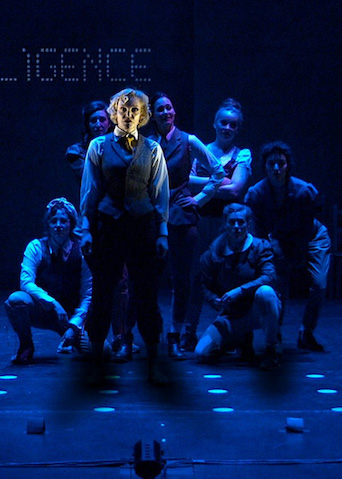Sunday, May 1, 2022
By MICHAEL WALSH
Today (May 1) marks the beginning of a month celebrated for its, ahem, creative energy. I can’t turn the page on the calendar without hearing Julie Andrews singing Guenevere’s anthem (from the 1960 Broadway musical Camelot):
Tra la! It's May! / The lusty month of May! / That lovely month when ev'ryone goes / Blissfully astray. / Tra la! It's here! / That shocking time of year / When tons of wicked little thoughts / Merrily appear!
Wicked thoughts, indeed. Last night, we were in the audience for the Vancouver premiere of The Invisible - Agents of Ungentlemanly Warfare, a musical drama about a British operation that sent female saboteurs into Second World War France during the Nazi occupation. Their anthem, more militant than Guenevere’s, featured the lyric Be Bold, Be Bold / But Not Too Bold. It was a story not just of agents, but one of agency.
And now I’m thinking about fascism, an ideology in resurgence. According to social historian Eugen Weber, fascism always emerges in response to the rising power of women. His insight was that “fascism in all of its forms seeks to re-establish patriarchy, not only in the family but in society and government.” When women become bold, well, men must act to put them in their place.
The Invisible, first produced in 2019 by the Edmonton-based Catalyst Theatre, is set in a time when the Nazi brand of fascism ruled in Europe. The stage play arrives in Vancouver at a moment when its subtext — women recognizing that the patriarchy is out to kill them — is front and centre again. Providing us with useful context were two recent television miniseries with similar themes.
In the last weeks of April, we’d seen Résistance, a 2014 French-language miniseries, on KCTS, Seattle’s PBS station. The historical drama is seen through the eyes of teenaged Lili, a young woman whose experience as a “patriot” during the Nazi occupation involves the loss of innocence, ideals and almost everyone she cares for.
Currently on view is Ridley Road, a 2021 BBC miniseries about the Anglo-Jewish response to the neo-Nazi movement in early 1960s Britain. Again, the focus is on a young woman who takes on the responsibility of fighting ultra-right ideologues.
The seven “girls” recruited by British operative Evelyn Ash (Melissa MacPherson) in The Invisible come to understand that their fight is not just against the Nazis, but for women. They eventually reject the caution “but not too bold,” realizing that it only reinforces patriarchal power. This May Day, that message is more important than ever.
Closer to home, I’m hoping that spring fever won’t slow my postings to Reeling Back. There have been five additions to the archive since mid-April, including:
PROTOCOL — In her role as executive producer, actress Goldie Hawn made sure there was a timely critique of U.S. Middle Eastern policy in this 1983 romantic comedy from director Herbert Ross. (April 30)
DELTA FORCE — Middle Eastern terrorists are no match for the American Rangers played by Chuck Norris and Lee Marvin in director Menahem Golan’s 1986 celebration of U.S. political privilege and firepower. (April 30)
THE FINAL OPTION — Inspired by a 1980 hostage-taking incident in London, director Ian Sharp’s 1983 thriller ignores the historic facts to craft a tale of military heroism involving Britain’s Special Air Service. (April 30)
THE GIRL WITH THE RED HAIR — Based on the true story of Second World War Dutch resistance fighter Hannie Schaft, director Ben Vergon’s 1981 historical drama stars Renée Soutendijk in the title role. (April 17)
BACK IN ACTION — Saskatchewan-born wrestling champion Roddy Piper demonstrated his acting chops in this 1993 made-in-Canada street-violence feature from director Steve DiMarco. (April 17)
[113]
